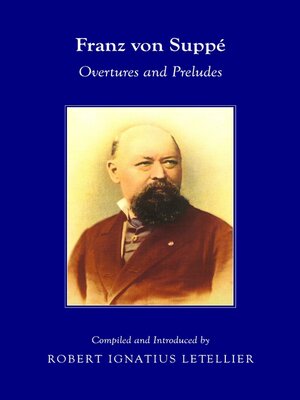
Sign up to save your library
With an OverDrive account, you can save your favorite libraries for at-a-glance information about availability. Find out more about OverDrive accounts.
Find this title in Libby, the library reading app by OverDrive.



Search for a digital library with this title
Title found at these libraries:
| Loading... |
The famous operetta composer Franz von Suppé (1819-1895) was of Italian and Belgian descent, and was born a subject of the Habsburg Empire in Dalmatia. His musical gift was evident from an early age, but he first studied philosophy in Padua and then law in Vienna, before he later enrolled in the Vienna Conservatory under Sechter and Seyfried. He became a conductor in theatres at Pressburg and Baden, then in Vienna at the Theater an der Wien (until 1862), at the Carl Theater (until 1865), and subsequently at the Leopoldstadt Theater. During the same time, he wrote light operas and other types of theatre music. After 1860, he consciously imitated the popular style of the Parisian operetta, and achieved great success with Die schöne Galathee (1865), effectively adapting the spoof of Antiquity that had brought Offenbach such fame (in Orphée aux enfers and La Belle Hélène). Suppé established the Viennese operetta as a genre in its own right, full of charm and gaiety, using a brisker style with vigorous popular rhythms. He wrote some 30 operettas, and 180 stage works in all. Almost all of them were produced in Vienna, with a few other premières in Prague, Berlin and Hamburg. Suppé's sense of boldly defined melody, impulsive rhythmic verve and brilliant orchestral technique found preeminent expression in his overtures, many of which became celebrated all over the world. Poet and Peasant; Light Cavalry; Pique Dame; Morning, Noon and Night in Vienna; and Boccaccio still retain a place in the light repertory of the concert hall. His most enduringly famous operetta remains Boccaccio (1879), based on episodes from the life of the famous medieval Italian writer. Fatinitza (1876), using a libretto adapted from Eugène Scribe, also became extremely popular. This collection brings together many of the celebrated overtures to operettas and plays that became Suppé's hallmark as a composer. Also included are some of the shorter orchestral introductions that the composer provided for some of his later stage works (such as Der Teufel auf Erden, Fatinitza, Donna Juanita, Die Afrikareise, Die Jagd nach dem Glück, and Des Matrosen Heimkehr).






